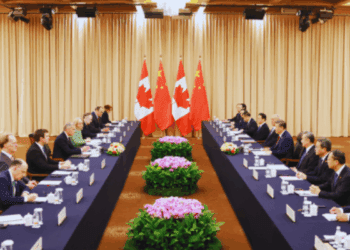This article originally appeared in the National Post.
By Joe Adam George, September 11, 2024
When he checked in for his flight to Boston, Egyptian national and 9/11 mastermind Mohammad Atta was selected for additional scrutiny by a computerized prescreening system called CAPPS (Computer Assisted Passenger Prescreening System). However, under security rules at the time, the only consequence of Atta’s selection was that his bags were scrutinized. He was not. Nine of his fellow al-Qaeda hijackers similarly managed to evade the enhanced security checks at other airports even though CAPPS flagged them. They proceeded to board three of the four planes used to carry out suicide strikes on September 11, 2001.
The 9/11 Commission Report, released nearly three years after the attacks, identified two “systemic weaknesses” in the U.S. border system: a lack of sophisticated counterterrorism measures as part of border security, and an immigration system that failed to meet its basic obligations, let alone support counterterrorism efforts.
These weaknesses sound all too familiar to most Canadians who have been rattled by the significant uptick in terror-related arrests and violent threats, particularly against Jewish communities, across the country in recent months.
Five arrests in four separate terrorism cases were made in just six weeks, from July 27 to September 6 this year. This includes the sensational ISIS case involving the Egyptian-born father-son duo.
These arrests have put Canada’s immigration system, once the envy of the world, and border security screening programs in the spotlight for all the wrong reasons.
With red-flagged foreign nationals deemed admissible and the Trudeau government putting immigration on steroids, Canada has become a destination of choice for violent Islamist extremists and sympathizers of listed terrorist entities to reside and conduct their illicit activities.
Canadians should be concerned. These extremists are arriving at a time when the global threat environment has escalated and federal security agencies are severely under-resourced, struggling to vet new arrivals.
These pervasive vulnerabilities in our immigration system are detrimental not only to our public safety and social harmony but also to the national security of our allies, as seen from last week’s arrest of the ISIS-inspired Pakistani national who attempted to illegally enter the United States via Quebec to allegedly perpetrate “the largest attack on US soil since 9/11” in New York City.
During his time as U.S. president, Donald Trump suspended travel to the United States by nationals from countries such as Iran, Venezuela, Libya, Somalia, Sudan, North Korea, Syria, and Yemen. Critics quickly accused him of being racist and anti-Muslim without recognizing that the ban was implemented on the advice of the Departments of State and Homeland Security due to the countries’ poor identity management practices, failure to share information with U.S. officials, and terrorist activity. Moreover, in future iterations of the ban, he removed some of the Muslim-majority countries like Chad and Iraq for falling in line, proving that the ban was not racially or religiously motivated.
For aspiring terrorists and their enablers, travel documents such as passports and visas are a weapon; a means to gain access to places and people. As the 9/11 report suggested, preventing terrorists from travelling can be as effective as sanctioning their assets, and therefore, constraining the mobility of violent extremists and their supporters should be a vital part of our counterterrorism strategy.
New technologies and more resources and training programs must be implemented to support the efforts of our security agencies in screening new arrivals, particularly individuals from areas of the world such as the Middle East or South Asia, where political violence is part and parcel of the culture and there is, therefore, a necessarily greater risk of spillover effects of violent behaviour or latent sympathies for listed terrorist entities.
At a time when resurgent terrorist groups like ISIS and al-Qaeda are inspiring attacks and recruiting candidates, our immigration policies cannot simply be a knee-jerk reaction to a terrorist attack like in the cases of Germany and Austria. Rather, any policy response should be calibrated and focused, not merely a blanket ban on individuals from certain areas, but a long-term commitment to thoroughly vet any individual seeking residence in Canada.
Twenty-three years have passed since the 9/11 attacks took place, yet Canada still has much to learn. The time to sensibly tighten our immigration policy and resource our national security apparatus is now.
Joe Adam George is a national security analyst on South Asia and Middle East affairs and has written for the Macdonald-Laurier Institute.






